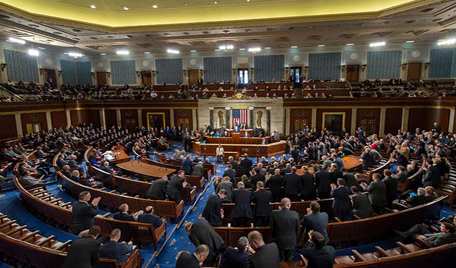On Wednesday, January 6, 2021, Congress will meet as required by the Constitution to certify the winner of the presidential election between President Donald Trump and former Vice President Joseph R. Biden in the Electoral College.
 As a resource, here is a list of statutes about Wednesday’s joint meeting of Congress, sections of the Constitution related to the Electoral College, and extensive resources from the National Constitution Center about the Electoral College.
As a resource, here is a list of statutes about Wednesday’s joint meeting of Congress, sections of the Constitution related to the Electoral College, and extensive resources from the National Constitution Center about the Electoral College.
Official Government Resources
This is the official Government Publishing Office version of the rules governing the joint meeting of Congress on Wednesday, incorporating the Electoral Count Act of 1887.
3 U.S. Code § 15 - Counting electoral votes in Congress.
3 U.S. Code § 16 - Same; seats for officers and Members of two Houses in joint meeting
3 U.S. Code § 17 - Same; limit of debate in each House
3 U.S. Code § 18 - Same; parliamentary procedure at joint meeting
The Electoral College: A 2020 Presidential Election Timeline. This Congressional Research Service overview has explanations, key deadlines, and names of statutes related to the Electoral College.
Counting Electoral Votes: An Overview of Procedures at the Joint Session, Including Objections by Members of Congress. This CRS report details the process and precedents governing the House and Senate meeting to certify the electoral vote, including challenges of the validity of electoral votes.
From the National Constitution Center
The National Constitution Center’s Interactive Constitution contains the Constitution’s full text along with interpretations from scholars representing different perspectives on the Constitution. Each Common Interpretation, signed by both scholars, is a joint statement of what they agree about a provision’s history and meaning.
Interactive Constitution
Electoral College: The Original Text
“Each State shall appoint, in such Manner as the Legislature thereof may direct, a Number of Electors, equal to the whole Number of Senators and Representatives to which the State may be entitled in the Congress: but no Senator or Representative, or Person holding an Office of Trust or Profit under the United States, shall be appointed an Elector. … The Congress may determine the Time of chusing the Electors, and the Day on which they shall give their Votes; which Day shall be the same throughout the United States.” - Click here for all of Article II, Section I
Common Interpretation: Article II, Section 1, Clauses 2
The 12th Amendment: The Original Text
Passed by Congress December 9, 1803. Ratified June 15, 1804. The 12th Amendment changed a portion of Article II, Section 1. A portion of the 12th Amendment was changed by the 20th Amendment.
“The Electors shall meet in their respective states and vote by ballot for President and Vice-President, one of whom, at least, shall not be an inhabitant of the same state with themselves; they shall name in their ballots the person voted for as President, and in distinct ballots the person voted for as Vice-President, and they shall make distinct lists of all persons voted for as President, and of all persons voted for as Vice-President, and of the number of votes for each, which lists they shall sign and certify, and transmit sealed to the seat of the government of the United States, directed to the President of the Senate; -- The President of the Senate shall, in the presence of the Senate and House of Representatives, open all the certificates and the votes shall then be counted … - Click here for all of the 12th Amendment.
Common Interpretation: The 12th Amendment
The 20th Amendment: The Original Text
Passed by Congress March 2, 1932. Ratified January 23, 1933. The 20th Amendment changed a portion of Article I, Section 4, and a portion of the 12th Amendment.
“The terms of the President and the Vice President shall end at noon on the 20th day of January, and the terms of Senators and Representatives at noon on the 3d day of January, of the years in which such terms would have ended if this article had not been ratified; and the terms of their successors shall then begin … Click here for all of the 20th Amendment.
Common Interpretation: The 20th Amendment
Constitution Daily Blog Posts
Looking Back: The Electoral Commission of 1877
Explaining how Congress settles electoral college disputes
The Constitution and contested presidential elections
Podcasts
America’s Contentious Presidential Elections: A History
Should we abolish the Electoral College?
Why Does the Electoral College Exist?
Town Hall Video
America’s Contentious Presidential Elections: A History
How to Fix Presidential Elections in 2020 and Beyond
The Right to Vote: A Constitutional History
Classroom Learning Materials: The Electoral College
Full Resource List: Election Resources for Educators
Scholar Exchange Videos
Electoral College Disputes and the Founders (High School and College level)
The Electoral College with Tara Ross







